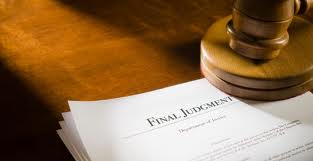 Reading this article will teach you why you must record a Florida Judgment and the steps for recording the final judgment
Reading this article will teach you why you must record a Florida Judgment and the steps for recording the final judgment
This is the second article in a series of articles I have put together on how to enforce and collect on a Florida final judgment. The first article “How Do I Collect on a Florida Judgment” introduced the preliminary steps that must be taken after obtaining a final judgment. The lesson from the first article was that final judgments do not collect themselves. Successful collection of final judgments requires one to act fast and to do several things simultaneously. Recording the final judgment is one thing you should do right away.
Recording the Final Judgment
Why should you record your final judgment? Recording the final judgment is the only way to announce to the world that you have a judgment against the debtor. Recording the final judgment is the only way to obtain a lien against any real property that the judgment debtor owns in the county where the judgment is recorded. Having a final judgment does not act as an automatic lien against the real property of the judgment debtor.
The Court or Clerks will not record your final judgment for you. This is a separate process you must do on your own. At a minimum, record the final judgment in the county where the judgment debtor resides or does business. If the judgment debtor has property in several counties, record your final judgment in each of those counties. You are urged to record your final judgment as soon as possible since the first to record will have priority in collecting over those that record final judgments afterwards.
How to record a final judgment
To act as a lien against real property, the final judgment must contain certain basic information. If that information is missing, the final judgment will not act as a lien upon the real property of the judgment debtor. The final judgment should therefore be properly prepared and contain all required information before signed by the Judge. A Judge will not tell you how to prepare a final judgment. If there is any doubt, please obtain the assistance of a Florida lawyer for help with your case before proceeding.
Assuming you have a properly prepared final judgment, the method for recording is fairly straight forward. You will need to obtain a certified copy of the final judgment from the Clerk of Courts and then record it in the public records and pay the appropriate fee for the same. After recording, the Clerk of Court will return a copy of your recorded final judgment to you with a stamp that indicates the date the final judgment was recorded and the exact book and page number where it can be found in the public records.
The Effect of Recording a Final Judgment
Credit bureaus and title companies routinely check county public records for recorded final judgments to determine if there are any outstanding liens or judgments against persons or companies. A final judgment will serve as a red flag and black mark upon the judgment debtor. This will affect the judgment debtor’s ability to obtain credit or to buy and sell real estate. Catching the judgment debtor during these crucial times will often motivate the debtor to pay you. This is precisely why it is so important to take that first step and to record your final judgment in proper form in the county public records.
Related Topics: Florida judgment enforcement; Miami debt collection lawyer; Florida collection law; Florida final judgments
